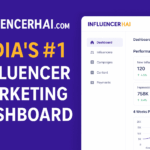Social media’s advent has altered how people and corporations engage. In fact, according to a Statista poll, using social media is among the most popular online activities platform. In 2021, there were more than 4.26 billion social media users worldwide; by 2027, there should be almost six billion.
Humans’ means of communication used to be limited to those they knew in person, but they are now available to everyone on the planet. When it comes to enterprises, social media has completely changed how firms operate today. Modern marketing strategies that use reels, blogs, vlogs, and live streaming via digital media channels have replaced traditional strategies.
You can trace the expansion of influencer marketing to how readily accessible the internet is. The government’s Digital India Initiative is another element that has contributed to the rise in social media users, which has created new opportunities for digital marketing. Influencers today are social media juggernauts with a massive fan following. This has given marketers a unique chance to identify the ideal influencer and work toward a wider audience.
Unquestionably, influencer marketing has altered how people view marketing in the present world. Both consumers’ wants and people’s behaviors for consuming material have changed dramatically. A Mckinsey study found that Gen Z, a group of people between the ages of 16 and 26, currently represents 40% of customers.
They are recognized as the most “plugged in” generation since they spend three hours daily reading and posting content on social media. This has prompted firms to update their marketing plans to meet the new generation’s needs.
However, the core principles of marketing and advertising continue to be the same, including conveying the correct narrative to the right audience in the appropriate location. But what is the proper narrative? The tale, however, varies from brand to brand. Although audiences tend to relate to native material on a deep level, it plays a vital part in interacting with them. Therefore, it has become crucial for brands to identify their target market and how they want consumers to view the brand.
Influencer marketing is a perfect venue for this because customers need to interact with a business several times before making a purchase. Imagine seeing a print advertisement for a recently released product and then watching your favorite influencer debate it on the social media platform of your choice.
Which of the two would have an impact on you? The latter is the correct response because influencer marketing is the best way for brands to connect with consumers through the audio-visual medium, which is undoubtedly a powerful medium for audience engagement. Market enthusiasts report that 61 percent of consumers rely on influencer recommendations, compared to only 38 percent who believe in sponsored and regularly slanted social media content.
High ROI – Influencer marketing is inexpensive because marketers can make small investments. Brands can use the influencer’s occasionally specific sales and engagement statistics to monitor their market performance easily.
Thus, they might develop strategies that are effective, suitably modify the information the influencer represents, and aim for a more significant ROI. Given the ROI, 17 percent of companies spend more than half of their annual marketing budget on influencer marketing activities, and industry analysts believe that number will rise.
Marketing without restriction- Influencer marketing has unlocked marketing possibilities and given firms new, effective ways to reach their target audience. Modern businesses were restricted to having a physical location, which in turn restricted their target market to individuals in the neighborhood and, as a result, limited the reach of their marketing.
On the other hand, influencer marketing has offered marketers the opportunity to engage with consumers globally in a more specialized manner.
In actuality, today’s shoppers require a customized shopping experience. Personalization is a “hygiene factor” in a Mckinsey analysis, and if businesses do it wrong, customers may switch to a competitor. Therefore, it is unquestionably essential for companies to determine the appropriate content to be shared by the right influencer with the right audience in the proper way.
Lead Generation – Undoubtedly, influencer marketing has benefited organizations because it has created new opportunities for engaging with customers and generating leads.
People are more likely to see the product or service evaluated by their favorite influencer compared to other traditional marketing channels. As a result, the brand gains a lot of advantages and generates more leads.
There is no doubt the fact that influencers today dominate from politics to products, cosmetics to attires, and influencer marketing as a whole is now a critical factor affecting the strategy of modern marketers.
In reality, influencer marketing will become increasingly important as time goes on. According to a MarketsandMarkets report, the global market for influencer marketing platforms is projected to reach $24.1 billion by 2025, expanding at a CAGR of 32.0 percent. Therefore, market dominance by influencers would completely alter the corporate landscape.
